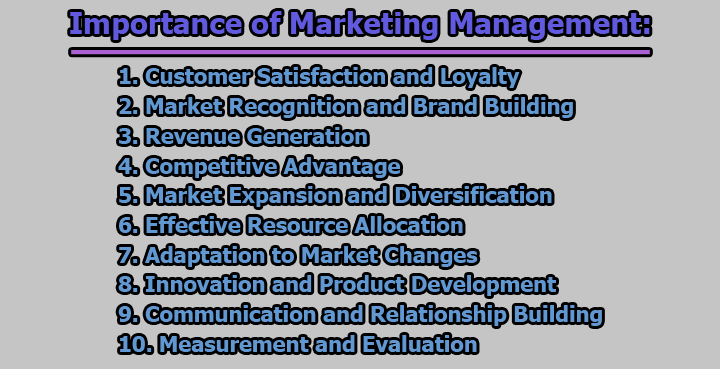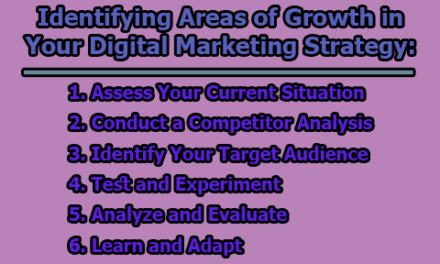Importance of Marketing Management:
Marketing management is an essential component of a business’s overall strategy and plays a pivotal role in its success and sustainability. Here’s an exploration of the importance of marketing management:
1. Customer Satisfaction and Loyalty: Marketing management is like a compass guiding businesses to understand what customers want and like. Through careful study and research, companies get insights into customer preferences, needs, and behaviors. This helps them create products and services that not only meet but often exceed customer expectations. Imagine buying something and being pleasantly surprised because it’s even better than you hoped for—that’s the magic of marketing. When businesses consistently deliver such positive experiences, they build strong, long-lasting relationships with customers. It’s like having a favorite store or brand that you trust because they always provide what you need and make you happy.
2. Market Recognition and Brand Building: Think of your favorite brands—what comes to mind? It’s not just the products; it’s the overall feeling, the logo, and the messaging. Marketing is responsible for creating that unique identity for businesses. It’s like giving a personality to a company. Through consistent advertisements, messages, and a recognizable logo, businesses become easily distinguishable in the market. It’s like meeting a friend in a crowd; you recognize them even from a distance. This recognition and positive image are crucial for businesses because it helps them stand out from the competition and become memorable to customers.
3. Revenue Generation: Imagine a business as a big puzzle, and marketing is the strategy to make all the pieces fit together perfectly. Well-executed marketing campaigns, smart pricing strategies, and making sure the product is exactly where customers can find it—these are the puzzle pieces that contribute to making money. Marketing isn’t just about selling things; it’s about selling them in a way that makes customers excited to buy. It’s the reason you choose one brand over another, and this choice ultimately leads to increased sales, helping the business grow and prosper.
4. Competitive Advantage: Think about the smartphone market—there are so many brands, each claiming to be the best. How do you decide which one to buy? That’s where marketing steps in. It helps businesses figure out what makes them special, their unique strengths that others might not have. This uniqueness is known as the Unique Selling Proposition (USP). Marketing ensures that customers not only know about this special quality but also understand why it matters. It’s like telling someone why your homemade cookies are better than any store-bought ones. This competitive advantage sets businesses apart, making customers choose them over others.
5. Market Expansion and Diversification: Imagine a small bakery that’s well-loved in a neighborhood. The owner might think, “What if people in the next neighborhood would also enjoy my delicious treats?” That’s where marketing strategies come into play. Businesses can explore new areas and new types of customers through effective marketing. It’s like finding new friends—you expand your circle by meeting different people. Marketing helps businesses identify opportunities for growth and reach out to untapped markets. This could mean selling to different groups of people or even in different parts of the world. It’s like taking your fantastic local bakery and sharing its goodness with a broader audience.
6. Effective Resource Allocation: Think of a budget as a limited supply of ingredients for a chef. Marketing management is like the chef deciding how much to spend on each ingredient to make the perfect dish. In the business world, marketing managers allocate resources such as money and time efficiently. They analyze which advertising channels, promotions, or distribution methods are most effective. This ensures that the resources are used wisely, maximizing the impact of marketing efforts. Just like a chef aims to create a delicious meal without wasting ingredients, marketing management aims to achieve business goals without unnecessary expenses.
7. Adaptation to Market Changes: Markets are like rivers—they keep flowing and changing. Marketing management acts as a navigator, helping businesses navigate through these changes. It involves keeping a close eye on market trends, understanding what customers are currently interested in, and being aware of what competitors are doing. This information allows businesses to adapt their strategies quickly. It’s like a surfer adjusting their stance to catch the best wave. By staying flexible and responsive, marketing management ensures that businesses remain relevant in an ever-evolving market, avoiding being left behind.
8. Innovation and Product Development: Imagine a company as a storyteller, and marketing is the creative process of coming up with new and exciting chapters. Marketing management keeps businesses on their toes, always looking for ways to innovate and improve. By staying connected to what customers want and paying attention to market trends, businesses can create new products or enhance existing ones. It’s like writing a story that captivates the audience’s imagination. Marketing guides the development of products that not only meet current needs but also anticipate future desires, keeping the business ahead in the market’s storyline.
9. Communication and Relationship Building: Consider marketing as the language businesses use to communicate with their audience. Through advertising, social media, and public relations, companies convey their messages and values. It’s like having a conversation with a friend—sharing stories, experiences, and reasons why the friendship matters. Marketing builds and maintains relationships between businesses and customers. It’s not just about selling but also about creating a connection. By consistently communicating and being transparent, businesses foster trust and loyalty, much like friends who trust each other because they understand and communicate openly.
10. Measurement and Evaluation: Picture a scoreboard in a sports game—it keeps track of the points and helps the team know how well they are doing. Marketing management involves setting clear goals, like a team setting a target score. Regularly evaluating performance against these goals is like checking the scoreboard. Through data analysis and metrics, businesses can understand what’s working and what needs improvement. It’s like a coach reviewing game footage to strategize for the next match. This data-driven approach allows businesses to make informed decisions for future marketing initiatives, ensuring continuous improvement and success.
In conclusion, marketing management is indispensable for businesses seeking not only to survive but to thrive in competitive markets. It goes beyond promoting products; it aligns the organization with customer needs, builds brand equity, drives revenue, and provides a framework for strategic decision-making and adaptation to a dynamic business environment.

Library Lecturer at Nurul Amin Degree College










